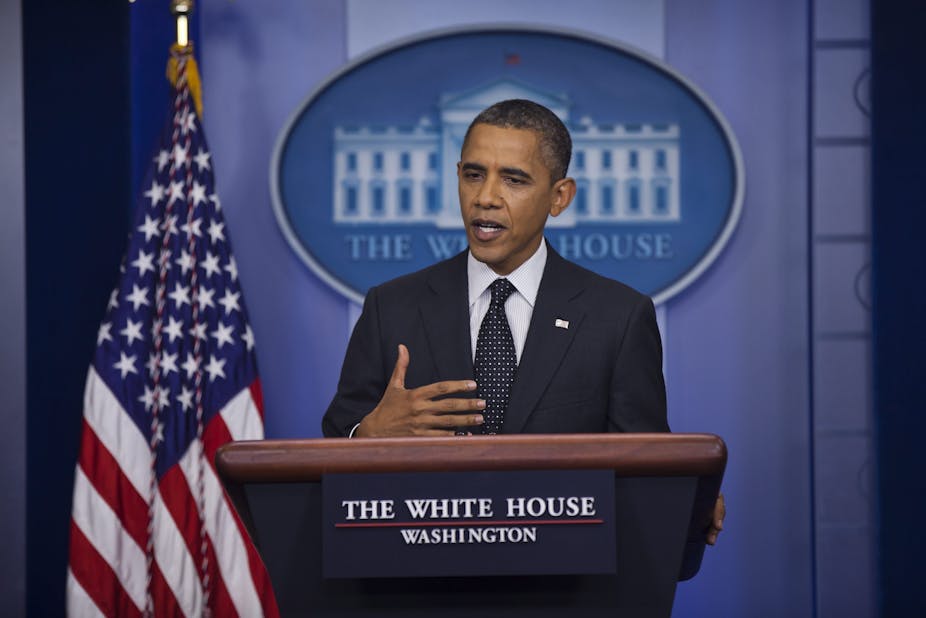It’s not often a little-known candidate for the U.S. Senate changes the dynamics of a presidential race. But in an interview released on Sunday morning, Missouri Representative Todd Akin did just that.
Akin was attempting to explain his opposition to abortion in cases of rape. He made his case in the most offensive way imaginable. A woman getting pregnant from rape? “From what I understand from doctors”, he claimed, “that’s really rare. If it’s a legitimate rape, the female body has ways to try to shut that whole thing down”.
In other words: if a woman gets pregnant, she couldn’t have been raped.
Condemnation, swift and without reservation, came from across the political spectrum. Republican presidential nominee Mitt Romney denounced the comments as “inexcusable” and “entirely without merit”. “Flat-out astonishing”, remarked the president of the National Organization for Women. But the most game-changing response of all came during a surprise press conference by Barack Obama.
Over the past few weeks, President Obama has faced mounting criticism over his refusal to take questions from the press. But after his performance Monday, his opponents may start wishing he’d stuck to that vow of silence.
Asked about Akin, Obama hit all the right notes. “Rape is rape”, he declared, a simple statement one wishes was unnecessary but clearly needs saying. He excluded other members of the GOP from his condemnation. “I don’t think they would agree with [him]”, Obama said.
Yet the president didn’t give his Republican rivals a complete pass. He used the incident to highlight what he called “a significant difference in approach between me and the other party”. For Obama, that difference boiled down to this: “We shouldn’t have a bunch of politicians, a majority of whom are men, making health care decisions on behalf of women”.
The language harkens back to what, five months ago, appeared to be a pivotal issue in the campaign: the “war on women”. In March and April, debates over contraception access devolved into slurs against sexually-active women. A yawning gender gap appeared, with women favouring Obama over Mitt Romney by 19 per cent. Across the country, women protested in numbers that seemed to presage high turnout in the November election.

But Americans soon moved on to other things. A slow summer with mediocre economic news and little to focus on other than occasional gaffes took the air out of the activism.
In pivoting from Akin’s indefensible remarks to the broader image of a Republican Party insensitive to women’s concerns, Obama reopened this front in his campaign.
This fall’s “war on women” won’t just be a retread of the spring’s talking points, however. Obama slipped a phrase into his comments that, if they’re smart, should keep Republicans up nights.
In pointing to “broader issues” that separate the Obama and Romney campaigns, the president first repeated his contention that lawmakers shouldn’t be making women’s health care decisions. He then added, “…or qualifying forcible versus non-forcible rape”.
Here’s the thing: Akin didn’t say anything about “forcible rape” in his interview. He said “legitimate rape”. Yet Obama didn’t misspeak. In 2011, Akin co-sponsored a bill limiting the rape-exemption for federally-funded abortions to “forcible rape”.
Opposition and outrage quickly mounted. Debbie Wasserman Schultz, a Florida representative and head of the Democratic National Committee, recoiled at the implication “that there is some kind of rape that would be okay to force a woman to carry the resulting pregnancy to term”. The Daily Show savagely mocked the bill in a segment outlining the differences between “rape” and “rape rape”. Public pressure eventually caused Republicans to strip the language from the bill.
And who co-sponsored the bill with Akin? Wisconsin representative – and newly-minted Republican vice-presidential candidate – Paul Ryan.
It is unlikely that Obama will personally go after Ryan on this issue. Obama has, in recent weeks, been working to restore the above-the-fray aura that served him so well in 2008. But his surrogates and SuperPACs no doubt got the message: Ryan on rape is fair game. The same groups that responded to Ryan’s Medicare cuts with an ad showing a Ryan-like figure dumping a senior citizen off a cliff will have a field day tying Ryan to Akin.
So the big question: Will all this matter on Election Day?
It will, in three ways. First, if Akin stays in the race he will almost certainly lose a seat he was predicted to win. Incumbent Democrat Claire McCaskill will stay in the Senate, and whatever slim chance the GOP had of gaining control of the upper chamber will vanish.
Second, Akin’s comments allow Obama to again shift the debate from a referendum on his less-than-brilliant first term to a choice between two competing visions. Using Akin’s medieval comments, Obama can portray the GOP vision as something out of a Margaret Atwood novel. If nothing else, that should reenergise the female vote.
And finally, by putting Ryan and Akin side-by-side, the Democrats reinforce their overarching message about the Republican ticket. They want to portray Romney and Ryan as out of touch, unable to relate to the real problems of real people. Romney feeds that narrative every time he speaks off the cuff, which is why he chose the wholesome Midwestern representative as his running mate. Ryan’s ties to Akin and the “forcible rape” bill, however, gives Democrats a chance to transform his earnest persona into a far more sinister one.
Akin’s original comment on rape lasted no more than thirty seconds. Obama’s response was only ninety. Yet given the narrow margins separating Obama and Romney, those two minutes could change the dynamics of the campaign – and possibly even the outcome of the November election.

